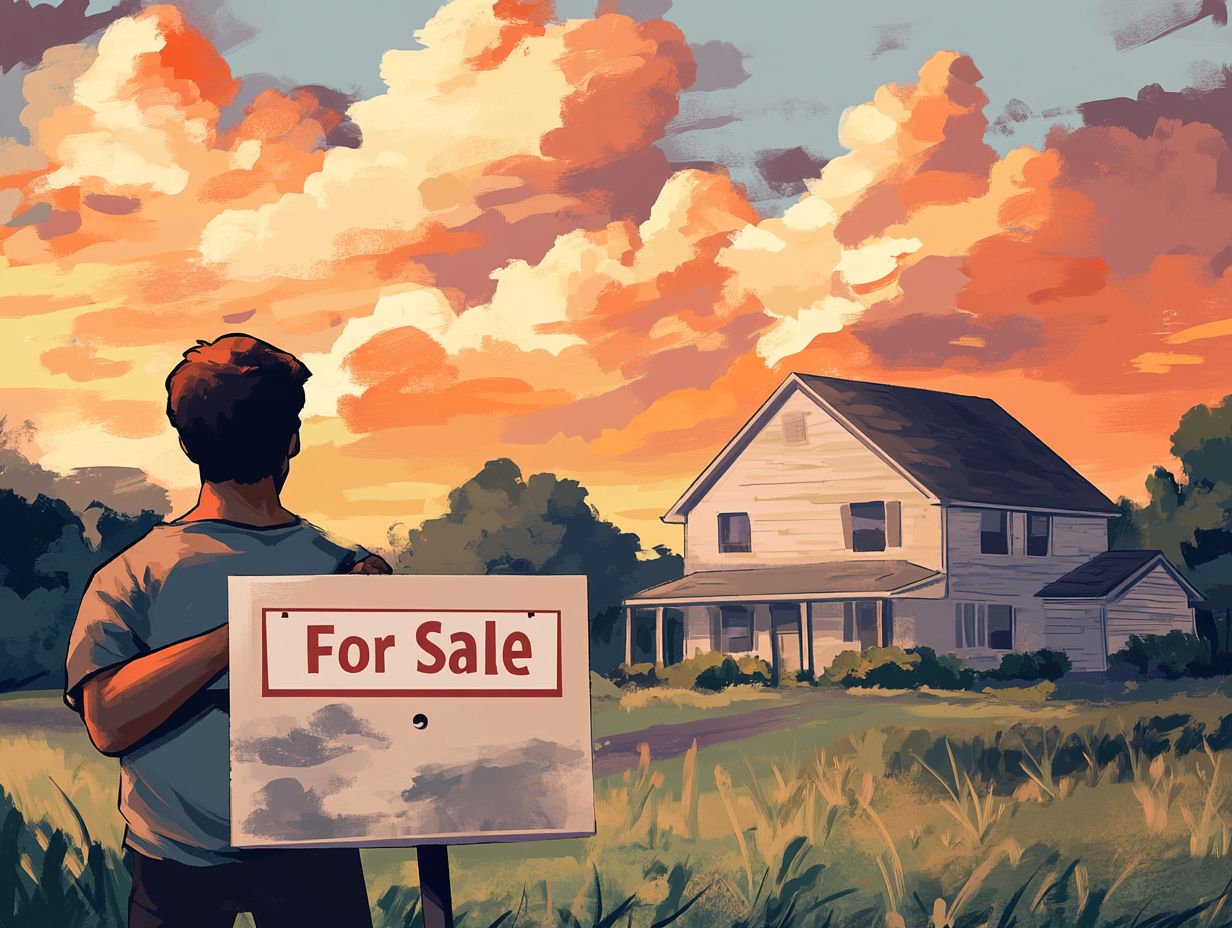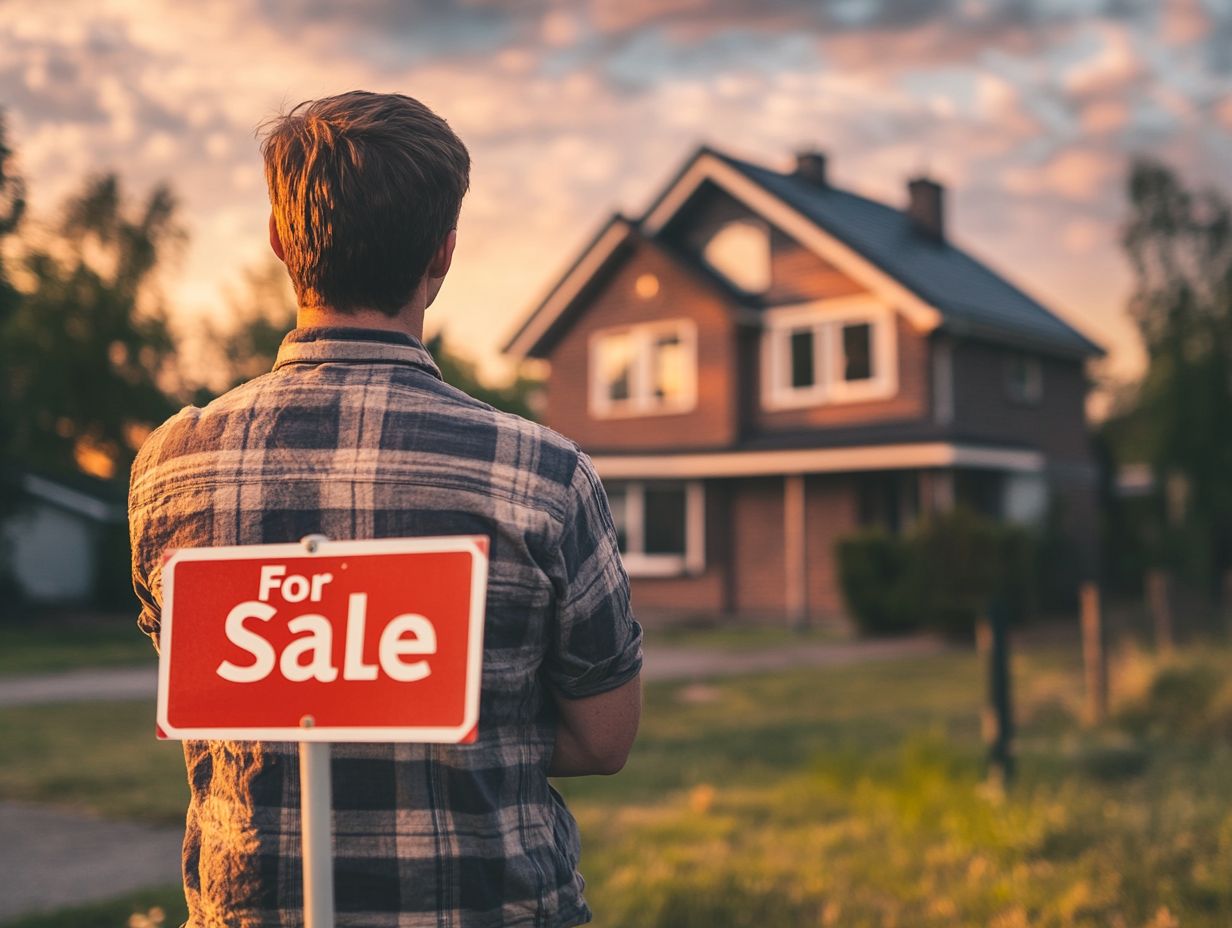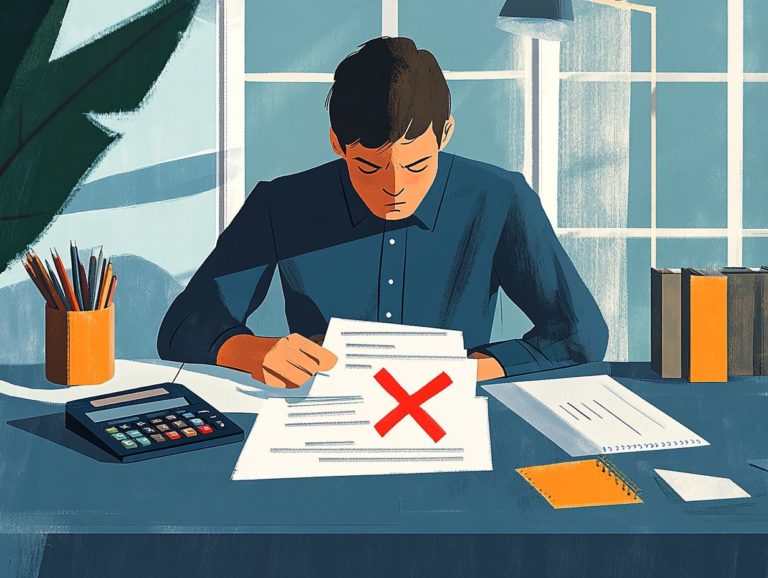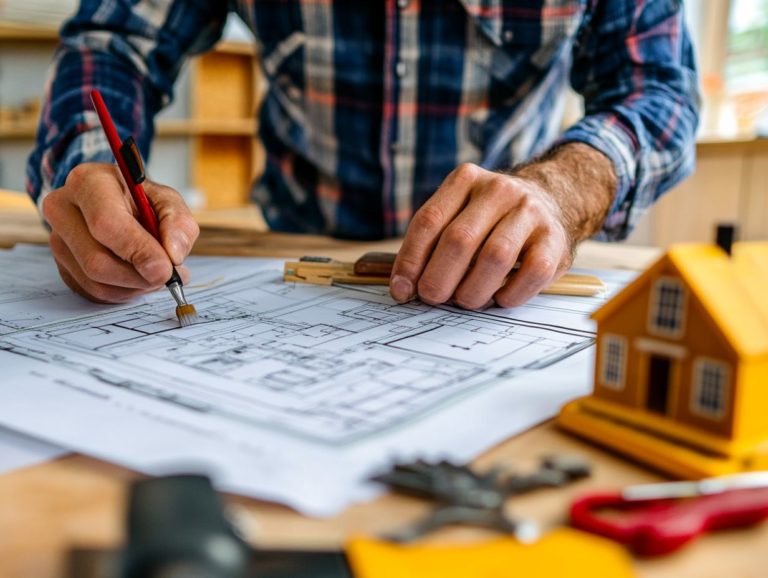What to Do if Your Home Isn’t Selling?
Is your home not selling as quickly as you’d like? If your home has lingered on the market longer than you’d hoped, rest assured, you re not the only one. Many homeowners find themselves in this frustrating predicament, often questioning why their property isn’t drawing in potential buyers.
This article delves into the critical factors that can influence your home sale, ranging from market dynamics to curb appeal. You’ll uncover effective strategies for marketing your property and learn how to collaborate with a real estate agent to achieve the best outcomes.
We will also explore other selling options that may benefit you. Continue reading to transform your home-selling journey and turn those challenges into opportunities!
Contents
- Key Takeaways:
- Reasons Your Home May Not Be Selling
- Assessing the Market
- Understanding Supply and Demand
- Strategies for Selling Your Home
- Effective Marketing Techniques
- Improving Curb Appeal
- Working with a Real Estate Agent
- Alternative Options for Selling Your Home
- Preguntas Frecuentes
- Qu puedo hacer si mi casa no se vende?
- C mo puedo hacer que mi casa sea m s atractiva para los compradores potenciales?
- Deber a bajar el precio de mi casa si no se vende?
- Deber a contratar a un agente inmobiliario si mi casa no se est vendiendo?
- Pueden las mejoras en mi casa ayudar a que se venda m s r pido?
- Qu debo hacer si recibo ofertas bajas por mi casa?
Key Takeaways:

- Assess the market and understand supply and demand to determine the best time to sell your home.
- Implement effective marketing techniques and improve curb appeal to attract potential buyers.
- Consider working with a reputable real estate agent or exploring alternative options for selling your home if it’s not selling on the market.
Reasons Your Home May Not Be Selling
As you navigate the intricate landscape of the home selling process, various factors may hinder your property from attracting potential buyers. For example, if your home is in a competitive real estate market or if emotional attachments are causing you to overvalue it, understanding the common reasons behind stagnant listings is crucial.
Overpricing your home compared to similar properties can severely dampen buyer interest. Additionally, inadequate listing photos or issues related to the home’s condition can also deter potential buyers. By recognizing and addressing these concerns, you can elevate your selling experience from a source of frustration to one of success.
Factors That Can Affect the Sale
Several factors can significantly influence the sale of your home, impacting both buyer response and overall market appeal. Potential buyers provide valuable feedback about home staging, which is crucial; if the staging is lackluster or uninviting, it could lead to negative perceptions and fewer showing requests.
Understanding the details of how homes are presented can give you a clearer perspective on effective home improvements. Effective home staging not only boosts visibility but also helps buyers envision themselves living in the space, making it an essential component of your marketing strategy.
Gathering and analyzing feedback is equally important, as it uncovers buyer expectations and highlights areas that may need adjustment. By staying in tune with these insights, you can fine-tune your approach whether that means rearranging room layouts or investing in small updates.
Adjusting your marketing tactics based on what buyers are looking for can streamline the selling process, ultimately leading to a more successful transaction.
Assessing the Market
Assessing the real estate market is an essential step in your home-selling journey. It involves a thorough look at supply and demand dynamics alongside current trends that shape property values.
By understanding the details of market conditions, you can establish a competitive listing price and identify the right moments to capitalize on market peaks for maximum return.
Utilizing a home value estimator will provide you with valuable insights into pricing strategies that resonate with buyer expectations.
If your home isn’t selling, make changes now to boost your chances!
Understanding Supply and Demand

Understanding the interactions of supply and demand in real estate is key to selling your home effectively.
High demand and low inventory mean you can set a competitive price. Conversely, if there are many homes for sale, you may need to lower your price to attract buyers.
By recognizing these market trends, you can adjust your strategy to attract buyers. For example, if buyer interest rises, improve your listing with great photos and staging.
If you are in a buyer’s market, consider pricing your home strategically and offering flexible terms.
Stay informed about local market trends to remain competitive. This proactive approach leads to a successful sales process.
Strategies for Selling Your Home
Crafting effective strategies for selling your home can enhance your experience and help it stand out in a competitive market.
Using unique marketing techniques to highlight your property’s best features will attract more buyers and increase showings.
A clear marketing strategy connects you with the right pool of potential homebuyers, making the process more rewarding.
Effective Marketing Techniques
Employing effective marketing techniques is essential for successfully selling your home. Your strategy should include high-quality listing photos and engaging presentations.
By leveraging online platforms, you can reach a vast audience more effectively. Social media channels like Instagram and Facebook allow for targeted advertising that captures attention with stunning visuals and compelling narratives.
Improve your listing presentations with detailed descriptions and neighborhood insights to boost buyer interest. Professional photography is crucial; homes that look appealing receive more inquiries and make a lasting impression.
These strategies create a strong marketing approach that leads to quicker sales and better offers.
Improving Curb Appeal
Improving curb appeal is one of the most effective strategies to enhance your property’s allure and attract potential buyers during showings.
- Simple upgrades like landscaping and fresh paint can change how buyers see your home.
- Elevate the front entryway with a new door or stylish house numbers for an inviting atmosphere.
- Add outdoor lighting to boost visual appeal and safety, showcasing your landscaping after dark.
- Plant vibrant flowers and maintain a tidy lawn to craft a striking first impression.
- Ensure your gutters are clean and refresh your mailbox for a polished exterior.
These thoughtful enhancements not only elevate aesthetics but also show buyers that the property has been well cared for, fostering trust and encouraging competitive offers.
Working with a Real Estate Agent

Collaborating with a knowledgeable real estate agent can elevate your home selling experience. They provide valuable insights that refine your selling strategy.
A skilled listing agent will guide you through market conditions, help you gauge buyer responses, and craft effective marketing tactics tailored to your unique property.
Start making these changes today to attract buyers fast!
Benefits and Considerations
Engaging a real estate agent offers numerous advantages that can elevate your overall selling experience. From expert guidance to a keen understanding of buyer expectations, their support is invaluable.
Collaborating with a professional enhances your negotiation strategies and allows you to use effective marketing strategies designed to attract the right buyers.
These agents bring invaluable local market knowledge to the table, enabling you to establish competitive pricing while showcasing your property’s unique features.
While it’s crucial to consider agent fees, many discover that the potential return on investment significantly outweighs the costs. This is especially true when a property sells quickly and efficiently.
Finding an agent who aligns with your specific goals makes a real difference. A dedicated professional not only assists with staging and listing but also expertly navigates the intricate paperwork, ensuring a seamless transaction from start to finish.
Alternative Options for Selling Your Home
When traditional methods of selling your home don’t deliver the results you seek, exploring alternative options can reveal new possibilities.
Consider accepting a cash offer or targeting specific traditional buyers. These strategies offer you valuable flexibility and simplify the process.
This approach is beneficial for those eager to expedite their transition into homeownership.
Exploring Other Methods of Sale
Exploring alternative methods of sale can unveil unique solutions when selling your home, especially in a competitive market where traditional approaches may fall short.
Options like owner financing, selling to investors, or leveraging online platforms cater to various buyer preferences and provide effective alternatives for listing your property.
Each of these methods has distinct advantages, such as increased flexibility in payment options and expedited closing times. For example, owner financing means you finance the sale yourself, allowing buyers to pay you directly.
On the other hand, selling to investors can lead to a swift transaction, making it an excellent choice for those in need of immediate cash.
You might face challenges like negotiating favorable terms with buyers and navigating the intricacies of different sales platforms.
Gaining a clear understanding of these nuances enables you to make informed decisions that align perfectly with your specific selling goals.
Preguntas Frecuentes

Qu puedo hacer si mi casa no se vende?
Si tu casa no se vende, hay algunas cosas que puedes hacer para ayudar a que se venda. Primero, considera bajar el precio. Esto puede atraer a m s compradores potenciales y hacer que tu casa sea m s competitiva en el mercado.
Tambi n puedes mejorar tu casa para hacerla m s atractiva para los compradores. Por ltimo, puede ser til trabajar con un agente inmobiliario que pueda proporcionar asesoramiento experto y ayudar a comercializar tu casa de manera efectiva.
C mo puedo hacer que mi casa sea m s atractiva para los compradores potenciales?
Hay varias formas de hacer que tu casa sea m s atractiva para los compradores potenciales. Primero, aseg rate de que est limpia, libre de desorden y bien mantenida. Esto ayuda a los compradores a imaginarse viviendo en el espacio.
Tambi n puedes hacer peque as actualizaciones, como pintura fresca o nuevos accesorios, para que tu casa luzca m s moderna y lista para mudarse. Considera amueblar tu casa para resaltar sus mejores caracter sticas y crear una atm sfera acogedora.
Deber a bajar el precio de mi casa si no se vende?
Bajar el precio de tu casa puede ser una buena estrategia si no se est vendiendo. Sin embargo, es importante considerar cu nto bajar el precio y cu ndo hacerlo. Consulta con tu agente inmobiliario e investiga el mercado para determinar la estrategia de precios m s efectiva para tu casa.
Ten en cuenta que bajar el precio demasiado puede hacer que los compradores potenciales sean esc pticos o que piensen que hay problemas con la casa.
Deber a contratar a un agente inmobiliario si mi casa no se est vendiendo?
Un agente inmobiliario es un recurso valioso si tu casa no se est vendiendo. Tienen experiencia en el mercado local y ofrecen consejos tiles para atraer a compradores.
Ellos manejan el marketing y las negociaciones, lo cual puede ser agotador para los propietarios. Aseg rate de elegir un agente con un buen historial y habilidades de comunicaci n fuertes.
Pueden las mejoras en mi casa ayudar a que se venda m s r pido?
S , las mejoras pueden hacer tu casa m s atractiva y ayudar a venderla r pidamente. Enf cate en reas clave como la cocina y los ba os, que son importantes para los compradores.
Considera tambi n actualizaciones m s peque as, como una nueva capa de pintura o l mparas modernas. Piensa bien en el costo y el retorno de la inversi n para cada mejora.
Qu debo hacer si recibo ofertas bajas por mi casa?
Si recibes ofertas bajas, no entres en p nico. Analiza la oferta y consulta con tu agente inmobiliario.
Ellos pueden ayudarte a decidir si vale la pena negociar. Cualquier oferta puede ser el inicio de una negociaci n, as que no dudes en hacer una contraoferta o establecer un plazo para motivar al comprador.






